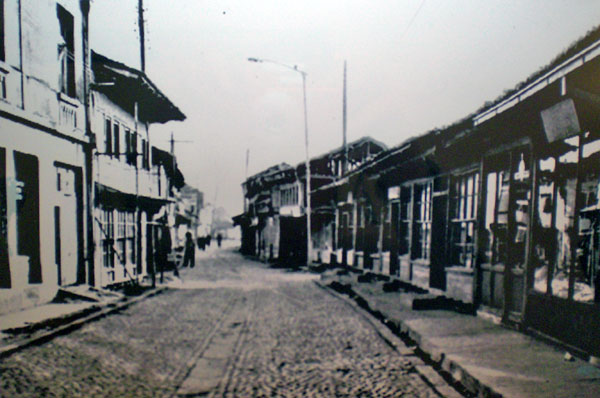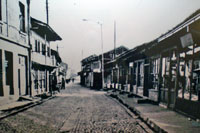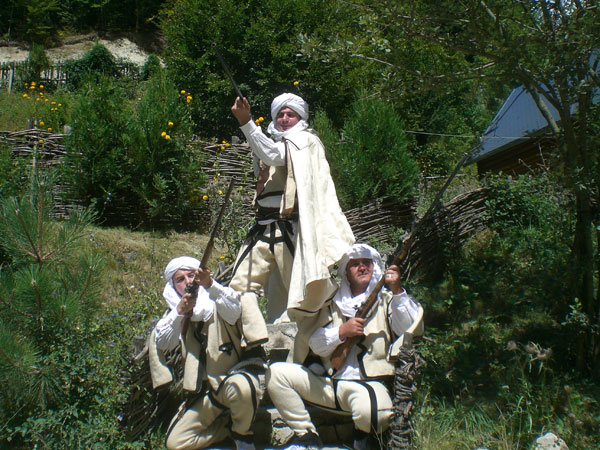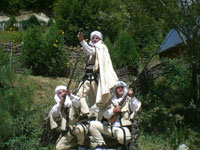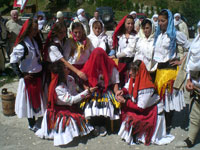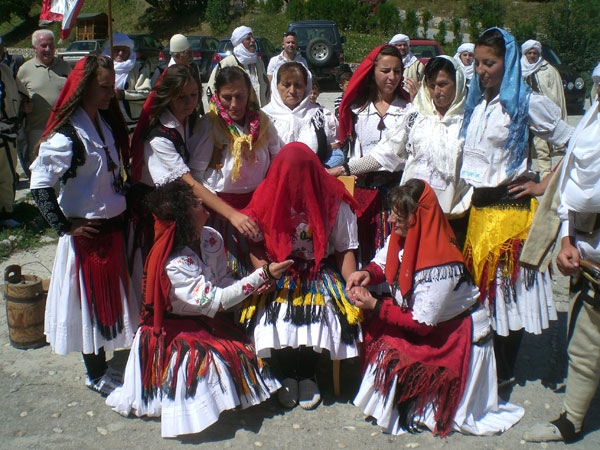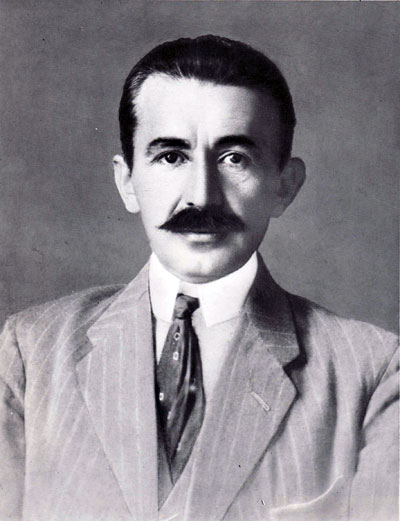| | Robert Elsie | AL Art | AL History | AL Language | AL Literature | AL Photography | Contact | |
Robert Elsie
Texts and Documents of Albanian History
BACK | AL History
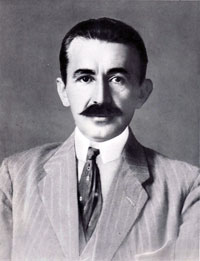
![]()
Hasan bey Prishtina
(Photo: Marubbi)
1921
Hasan Bey Prishtina:
Brief Memoir on the Albanian Uprising
of 1912Hasan bey Prishtina (1873-1933) was born in Vushtrria (Kosovo) and attended a French secondary school in Thessalonika and a college of administration in Istanbul. His actual name is Hasan Berisha. He initially supported the Young Turks and was elected to the Turkish parliament in 1908, but, having eloquently denounced Ottoman massacres in parliament, he lost his position in 1912 as did all the Albanian deputies. Prishtina was leader of the uprising in Kosovo from May to July 1912 and formulated the autonomy demands that were made of the Turkish government in August 1912, the so-called fourteen points of Hasan Prishtina.
In December 1913, after Albanian independence, he served as minister of agriculture, and in March 1914 was made minister of postal services. He spent World War I organizing divisions of volunteers to fight for Austria-Hungary. In 1918, after the Serb occupation of his native Kosovo, he fled abroad with Bajram Curri to Vienna and then to Rome, where he was in contact with Macedonian, Croatian and Montenegrin opponents of the new kingdom of Yugoslavia, and became head of a Committee for the National Defence of Kosovo (MKK). In October 1919, Hasan bey Prishtina travelled to Paris to attend the Paris Peace Conference on behalf of the Committee and to plead for the unification of Kosovo with Albania. The Kosovar delegation was, however, not given leave to participate in the debates. He then returned to Albania where in January 1920 he helped organize the Congress of Lushnja and in April 1921 became a member of parliament for Dibra. He took part in a coup d’état that year and served as prime minister for a brief five days from 7 to 12 December, but was forced out of office by Ahmet Zogu (1895-1961) who regarded it as imperative to avoid conflict with Belgrade. Thereafter, Hasan Bey helped organize uprisings in Kosovo and led several antigovernment insurrections in Albania, the latter being easily suppressed by the administrations of Xhafer bey Ypi (1880-1940) and Ahmet Zogu. He returned to Tirana during the so-called Democratic Revolution of 1924 under Fan Noli (1882-1965), whom he accompanied to the League of Nations in Geneva. When Zogu took power in December 1924, Hasan Bey Prishtina was forced to leave Albania. As he could not return to Kosovo, he settled in Thessalonika where, as a man of means, he purchased a large house. Like most Kosovo politicians, Hasan bey Prishtina was a sworn enemy of Ahmet Zogu, the two having attempted to assassinate one another. King Zog eventually won out when Hasan bey was murdered in Thessalonika by one Ibrahim Çelo. His remains were reburied in Kukës in 1977, near the border to Kosovo.
In this short memoir, Hasan bey Prishtina describes the 1912 uprising he headed. Had the rebellion against Ottoman rule been successful, it might have led to Albanian independence being declared in Kosovo rather than in Vlora (November 1912 by Ismail Kemal bey Vlora). It is doubtful, however, if his autonomous Albania including Kosovo would have survived the Serb invasion of the autumn of that year.
I. The Reasons for the Uprising
There are many varied reasons, but let us assemble them in the following themes:
the chauvinism of the Young Turk committee,
the incompatibility of Turkish freedom with Albanian customs and traditions, in particular with those of the Ghegs,
pan-Islamic intrigues in the government administration,
the interference of the army in politics,
Turkish atrocities in 1910,
the evolution of national awareness in Albania,
the barbaric and illegal system implemented by the Young Turk government in the elections of 1912.
II. Before the Armed Uprising
A Historic Day in the Ottoman Parliament
Unbridled terror held sway in Albania at the end of Turgut Pasha’s operation (in 1910) which ended to the full satisfaction of the Turks. There were no more clubs, committees or schools in Albania. The Bashkim people (as the Turks called the Albanian nationalists) were scattered and nothing was left of the national organisation. The 1911 movement in the Highlands, the activities of the Bulgarian committee in regions of Macedonia, the confusion that arose among the Ottoman factions after the founding of the Freedom Agreement, and the Italo-Turkish war that broke out over the Tripoli issue all brought about something of a positive turn to this desperate situation.
Towards the end of 1911, inspired by anger at Turkish outrages, the opposition party asked a question about the situation in Albania and forced Hakki Pasha to account for it in parliament. Most of the deputies from Albania requested that I react to the explanations of the Turkish vizier on the basis of the documents they had gathered on these acts of cruelty.
The discussion began and was heated from the very start. And there was no end to it. We were strong in logic and had witnesses at hand. I also took the floor. I severely criticized the shameful policy being carried out in Albania. I gave reasons for my fierce criticism and in the end, gathering all my energy, I concluded with the following sentence: “If the Government does not change its policies and administration in Albania, if the Albanians do not receive the political rights that are incumbent upon them, it is inevitable that there will be an explosion, and grave and bloody incidents will be the consequence.”
An Arab deputy responded as follows: “What do you mean by ‘grave and bloody incidents’?”
I replied: “I mean that if the ‘Young Turks’ continue pursuing these cruel domestic policies, I myself will be among the first to raise the banner of rebellion.”
This statement, made before over two hundred deputies, the Turkish cabinet and my listeners, exploded like a bomb.
Hakki Pasha rose and declared: “If Hasan Bey had used this expression for the good of the country, if would have been of great service. But the aim of Hasan Bey is to set the whole empire alight.”
I countered: “Pasha, I have only spoken the truth. If true freedom should ever take hold in this country, your country, you and your colleagues will no longer be here but before the divan ali (high court).” When we left parliament, the Albanian deputies and the Albanians of Istanbul gave expression to their boundless joy and congratulated me with particular warmth. Ismail Kemal Bey also congratulated me warmly and proposed that we meet for dinner at my house to have an opportunity to discuss the current situation at length.
Thus ended the historic day that brought to a head the disagreement between Albania and the committee of the Young Turks.
III. The Decision
As he promised, Ismail Kemal Bey arrived at my house for dinner and we spent the whole night there talking. We discussed the fate of Albania at length and finally decided to put an end to Turkish outrages with an uprising. The conversation ended with these words:
Ismail Kemal Bey: “Hasan Bey, I am thoroughly convinced of your character. This conviction has led me to inscribe in my heart the words that you used in parliament when you said ‘I myself will be among the first to raise the banner of rebellion’.”
I replied: “Ismail Bey, before I speak, I reflect carefully on what I am going to say and then I speak out. But I can assure you that I am accustomed to adhering to whatever I say. You, too, may feel that an uprising is necessary, but our decision alone will not suffice to put the matter into practice. I think we will need to have four or five other men with us who give their support to the decision.”
Ismail Kemal Bey replied: “Yes, I quite agree.”
He then proposed that we meet on the next day at the Pera Palace Hotel to continue discussions on the matter.
IV. At the Pera Palace Hotel
The next day, Ismail Kemal and I talked for over three hours and then decided to hold a meeting with the following men: Mufid Bey Libohova, Essad Pasha Toptani, Aziz Pasha Vrioni and Syreja Bey Vlora. Ismail Bey talked to some of them, and I to others. When we realised that they held the same views as we did, we decided to hold a meeting at the home of Syreja Bey, in Taksim.
V. The Taksim Meeting
The meeting was chaired by Ismail Kemal. In view of the gravity of the matter before us, I proposed that we all swear an oath before beginning. This proposal was accepted and we all swore to one another that we would not tell anyone what was discussed and decided upon at the meeting. The discussions began after the taking of oaths.
All the outrages committed by the Young Turks in Albania were listed and mentioned, as were their increasingly harsh policies on schooling and publications. As to political or administrative gains, one could not reach any agreement with them, not even talk to them about such things.
The meeting did not last long and everyone agreed on this point: “To put an end to Turkish policies affecting our national culture and to ensure some political gains for Albania, there was no other way out than a general uprising.” It was thus decided to organise an uprising and the conversation turned avidly to this second topic. How was this uprising to be organised and when was it to begin?
Kosovo was to play a central role in the matter. For this reason, it was decided to find and send fifteen thousand Mauser rifles into Kosovo, through Montenegro, as well as ten thousand gold Napoleons to be kept awaiting my order. Ismail Kemal, who was optimistic that he could achieve this, took the implementation of this decision upon himself. I assure the others that I could organise the uprising throughout Kosovo and that it would take place as soon as I received the weapons and the money. However, in order to act as quickly and effectively as possible, we considered that a limited uprising in Kosovo would not suffice. As such, we also resolved that Toskeria and Central Albania should also take part in the uprising several days after Kosovo.
In reply, Essad Pasha assured us that he could manage things in Central Albania and Mirdita. As to Mufid Bey, Aziz Pasha and Syreja Bey, they promised to lead the armed bands of the south themselves. Ismail Kemal was given the task of staying in Europe to help gather weapons and money and to win over European public opinion to the cause of the uprising.
Such was the gist of the meeting before we left the house of Syreja Bey. Turning to my companions, I said; “I am convinced that you are all men of honour, but I wish to state here that, whatever way things evolve, I will be up in the mountains when the rebellion breaks out. I have given you my word of honour about this. I beg you not to leave me alone, for you have given your words of honour, too.”
All answered: “You can be sure that we will also carry out our obligations.” This was the end of the meeting and the Taksim plot.
VI. While Waiting for an Audience with the Sultan
It was not only the Albanians who opposed the Young Turks, but ethnic groups throughout the Otoman Empire, even some of the Turkish population. This gave us courage while we were making our preparations and ensured us that, in the days before the uprising, we had the sympathies of people from throughout the empire.
As such, in order to invigorate the anti-Young Turk movement somewhat, the Albanian faction took the initiative to form a deputation consisting of five members (Albanian, Arab, Turk, Kurd and Armenian) to present the concerns of the opposition to the Sultan. I was a member of this deputation.
Nafi Pasha, representative of the Arab faction, criticised the policies of the Young Turk Party harshly, adding that sooner or later, these policies would destroy the foundations of the Empire. When Nafi Pasha was finished, I took the floor and said to the Sultan:
“Majesty, if an end is not put immediately to the misguided policies being carried out by the Young Turk Party throughout the empire, much blood is likely to be spilt in this country and we will be hurtling towards destruction. The only means of salvation to overcome this peril is to remove the Young Turk Party.”
My words impressed the Sultan to such an extent that he had tears in his eyes. The audience ended well, but the gain was purely moral because the Sultan did not have enough power to put an end to the rule of the Young Turks. We realised this the next day when Tanin, the party newspaper of the Young Turks, came out with a vicious article against me, bearing the following title “Hasan Bey of Vulçitirni [Vushtrria], deputy for Prishtina, has begun to threaten us in the presence of the Sultan.”
VII. Challenge to a Duel
This article, to which I was forced to reply, launched a rabid polemic exchange in the Istanbul press that resulted in a challenge to a duel that I sent to Hüsein Cahid, the editor of Tanin.
The Sheikh-Islam published a fatwah opposing the duel, insisting that it was against the prescriptions of Imperial and Sharia law. Not only did it ban the duel, but it forced us to end the quarrel. We made up, and Hüsein Cahid and Tanin stopped publishing articles against me and against the Albanians.
VIII. The “Freedom and Conciliation” Party and the Albanian Uprising
Based on the actions of the movement that the Taksim conspirators had initiated at that time in the conflict between the Freedom and Conciliation Party and the Union and Progress Party, many people later claimed that the 1912 uprising was organised with the knowledge and support of the Freedom and Conciliation Party.
This claim is in complete contradiction to the truth because we were not crazy enough to inform the Turks about our Albanian plot, nor would the Turks have allowed the Albanians to take up arms against their army. The conspirators profited from the antagonism between the political parties, but without infringing in any manner on the purely national character of the plot.
The Freedom and Conciliation Party was unable to learn anything more about it than the ruling Young Turk Party. The role of the conspirators at this time was as follows: To stir up antagonism between the two main parties in Ottoman politics in every possible way.
IX. The Dissolution of the Ottoman Parliament
The opposition party was gaining ground day by day. The antagonism had reached such a point that the Young Turk Party had no alternative but to dissolve parliament. This step was certainly a last resort that any political party would try in order to prove or attempt to prove its case in a losing battle.
The Young Turk Party made use of its courageous, revolutionary reputation and used this ‘last resort’ card to its advantage. Parliament was thus dissolved, which resulted in unparalleled dismay in opposition circles.
On this occasion, I said to the Arab and Kurd deputies that the Cemiyetci [Young Turk Party] (1) people would try to win the coming elections using illegal and perhaps terrorist means, so there was nothing else we could do but take to arms to win our political rights. My aim with this propaganda was to give them courage and push them to join the uprising.
X. The Bulgarian Committee in Macedonia and the 1912 Uprising
When the Ottoman Parliament was dissolved, Ismail Kemal Bey set off for Europe and I for Kosovo. We agreed to keep in contact through the British Consulate in Skopje.
When I arrived in Skopje, the first thing I had to do was to take a real step towards an agreement between the Albanians and Macedonians. I went to meet Mr Pavlof, one-time deputy for Skopje in Turkish times and later Bulgarian ambassador to Prince Wied in 1914. This is the gist of what I told him: “Since the 1908 Constitution, the Turks have been and are committing massacres in Albania and Macedonia. They have never shown any respect for the rights of the Albanians and Bulgarians. The terror that they are exerting is getting worse and worse and they are pursuing exclusively pan-Turkish policies. I believe that the time has come to throw off this cruel yoke by means of a joint uprising with a view to creating an autonomous Albanian-Macedonian state. I think it is really important that we not lose this opportunity and I am sure that we will come out victorious if you agree to take part in the uprising, even if only when you see that the Albanians are winning.”
Mr Pavlof replied as follows: “Your proposal is of such importance that I cannot give you an answer without my sending an envoy to Sofia and without orders from our Committee headquarters. The branch in Skopje has no authority to take decisions on such an important issue. Please give me time until my representative gets back.”
XI. Endeavours with the English Consul in Skopje
While waiting for the reply of Mr Pavlof, I went to see the British Consul in Skopje and informed him of the following: “In order to put an end to Turkish massacres in Albania and to overcome impediments in the alphabet question and issues of our national culture, we Albanians have decided that the only way out is an armed uprising against Turkish rule. In this perilous situation, we are in great need of England’s support. I would therefore ask you to inform the Foreign Secretary about this statement of mine.”
The consul was a very liberal gentleman. He replied that he would communicate this at once to his government that would certainly spare no pains in providing strong support for an Albania taking up arms for the cause of freedom. “Nonetheless,” added the British Consul, “I can only give you a definitive reply when I receive a response from London.” (2)
XII. The Leaders of Kosovo
In Kosovo, there reigned a muffled rage at the Young Turk Committee. As such, everyone to whom I mentioned the need for an armed revolt reacted positively. I spoke with many people from the local leadership about an uprising, but in private and with great reserve. The issue was of the utmost importance and the strategy for its implementation required secrecy and skill more than any other. Thus, those who were informed of the uprising were not able to communicate with one another, but had to go through me. As some of these men are still living in Kosovo, where Slav atrocities are now a common occurrence, I cannot mention them by name, only those who have died and cannot be harmed anymore by the barbaric rule of Serbia. Riza Bey Kryeziu of Gjakova, Zejnullah Bey, my cousin from Vushtrria, Isa Boletini, Xhemal Bey Prishtina, Halim Bey Deralla and Ahmed Bey Gjakova, swore with me, one by one, that they would go right to the end. The leaders of Llap and Drenica also gave me their word.
The uprising was to begin the day that I would be in Drenica, i.e. the highlands of Vushtrria and Mitrovica, and would be wearing opinga [traditional moccasins]. All of those who had sworn the pact with me would take to the hills with me.
XIII. Ismail Kemal
The moment for the uprising was swiftly approaching. I wrote to Ismail Kemal, reminding him to fulfil his promise. He procrastinated and sent me nothing but empty promises. I was now so deeply involved in the undertaking that I could not lose a minute for fear that those who had given me their word would despair and grow weary of the matter.
This is what happened, for example, with Nexhip Bey Draga. He had given me his word, as did the others. One day Selim Fanda came by and told me: “I met Nexhip Bey at the Stone Bridge and he said ‘You see, Selim Aga, the police are already after me!’ Do you think he knows about the planned uprising?” “No,” I answered, “he knows nothing.” “If you were a policeman,” Selim Fanda replied, “you would be able to get anything out of him, given the fear I saw in his eyes.”
My blood ran cold when I heard this, and I realised that I had to do something to calm down Nexhip Bey. I met him at Izzet’s Café, from where we walked to the Turat Café. There, after a conversation about insignificant matters, I broached the subject, saying: “I told you that we were going to organize a general uprising, but now I have come to realise that it is not realistic. It can only be done in a couple of years’ time, and I have given up the plan that I had.” With this trick, I overcame Nexhip Bey’s panic.
In addition to this, as we needed money and arms, I began to put pressure more seriously on Ismail Kemal Bey.
In the most critical days of our preparations, Mr Pavlof came to see me at my place and informed me that the Bulgarians would not, on any account, take part in the uprising. I was surprised and could not fathom why the Macedonians were refusing to join us when, not long ago, they were faced with great opposition from us in their movement to liberate Macedonia. (3)
This reply, together with the apathy that Ismail Kemal Bey evinced in fulfilling his promises, created an atmosphere of despair.
We had very little money and the work I began was overwhelming. I needed to come up with funds right away! There was only one way out: to sell the warehouses I had in Skopje and begin the uprising with this capital. So, I sold the warehouses and, pretending that I had election business to attend to, I set off for Vushtrria with Nexhip Bey Draga who was on his way to Mitrovica.
From Vushtrria I sent people around to inform the conspirators that the time for action had arrived.
XIV. The Drenica-Junik Uprising
On 5 May 1912, I was in Drenica with Zejnullah Bey, a fellow known for his loyalty, patriotism and generosity.
From Drenica, I wrote two letters, one to the sub-prefecture of Vushtrria and the other to Nexhip bey Draga in Mitrovica.
The first letter can be summarized as follows:
“Convinced that Young Turk policies are continuing to do great damage to Albania, as I stated in parliament, I am raising the banner of rebellion against Turk rule today.”
The essence of the other letter was as follows:
“All Kosovars and I have raised the banner of rebellion against the Young Turks. This man will bring you to me and my companions, unless you wish to be separated from the people of Kosovo.”
The following words were exchanged between Nexhip bey Draga and Ahmet Prekazi, the messenger:
“Where is Hasan bey?”
“I don’t know. I do not have much time to talk and listen. If you intend to come, I am ready to take you there.”
“I am ill. I cannot come,” replied Nexhep bey.
I sent the letter of Nexhip bey so that he would not later criticise me, claiming that I had not duly informed him and that this was why he did not take part in the uprising.
We spent the first night in Balinca and the next day we set off for Prekaz with two hundred armed men, to the house of Ahmet Delia where the leaders of Drenica had gathered and were asked to repeat the oath they had sworn.
The oath was sworn as follows:
“We swear and promise as men that we will make whatever sacrifice is necessary and, if needs be, will even sacrifice our families and children.”
When we reached Gjyrgjevik (near Peja) at the house of Sadik Rama, the oath was repeated. From this area we continued on to Pozhar in the region of Gjakova.
The number of our men increased as we advanced and by the time we were there, we were in a position to raise a large rebel army.
We thus arrived at Junik, the historic place where Peja and Gjakova always met and swore oaths to resist Turkey.
The old bazaar of Gjakova.
XV. The League of Junik
The people of Junik welcomed us with great hospitality. When we got there, I sent a letter to Riza bey Gjakova that can be summarized as follows:
“My companions and I have arrived in Junik to attain our objective. We are waiting for you and the leaders of Gjakova.”
The next day, Riza bey was in Junik. Ahmed bey, the son of Myrteza Pasha, had come to Junik with us. Soon thereafter, Hassan Feri arrived with the leaders of Plava and Gucia.
At that time, there was unrest in the highlands of Gjakova. Using the election issue as a pretext and instigated by Ahmet bey, the highlanders had begun to threaten Gjakova town. They were demanding that their national language be taught in public schools.
Zeqir Halili, one of the major leaders of the Krasniqi tribe, was at the head of this movement. In the uprising of 1912, Zeqir Halili carried out all of the instructions he had received and fulfilled his patriotic duties completely.
All of those who claimed to represent the people of Kosovo were now gathered for a few days in Junik.
Among them was Bajram bey Curri who arrived and was upset because I had not informed him while we were in Skopje. Learning how angry Bajram bey was, I call him over and said in a joking manner:
“What was I supposed to do when I saw that you were on good terms with the Cemiyetci?”
“I am an Albanian,” he replied, “I have never had any ideas except those in support of the Albanian cause, and time will prove this to you.”
“Bajram bey, we have embarked on this endeavour. We have pledged to secure a number of privileges for Albania. If we cannot attain our objectives, we will be reduced to a state of oppression like the Turks of the plain of Haymana, (4) proving right what Talaat bey, the head of the Young Turks, stated.”
Bajram bey quickly understood the importance of the situation, and our conversion continued as follows:
“To fight a whole empire and defeat it, you will need a lot of equipment, in particular many weapons, much ammunition and a lot of money,” stated Bajram bey.
I replied: “Ismail Kemal bey promised to send us 15,000 rifles and 10,000 Napoleons, but I don’t think we are going to get them. He has not even sent us any money as yet. But, Bajram bey, we do not really need all these things. If we are not able to rise without the rifles and money, we will just have to learn to live like the Turks of Haymana.”
“Yes,” responded Bajram bey, “you are right. It is a sacred obligation for us to repel all enemies, even without arms. War has imposed this obligation on us. We must achieve our rights and save ourselves from slavery.”
Most of the leaders of Kosovo were gathered in Junik. We did not have much confidence in the leaders of Peja, but we invited them to Junik, too.
Zejnel bey, Sejfeddin bey and Jashar Pasha arrived and we explained to them why we had gathered.
Not only did these gentlemen not show good will, they began to campaign secretly to torpedo our objective. To a certain extent, they had even convinced Riza bey Gjakova. We could have embarked on the endeavour without the support of the leaders of Peja, but we preferred to be united to have an easier time of it.
We had to take a courageous step and confront the leaders of Peja and Riza bey Gjakova with a fait accompli.
I made an agreement with Ahmet bey and Myrteza Pasha to order the men of Berisha to open fire on the Turkish army in the vicinity of Peja.
Early the next morning, before sunrise, fire was opened on the Turks and there was no more room for diplomacy.
We sent a fellow to Riza bey who pretended that he had come from Gjakova that day to inform him that the Turks had sentenced Riza bey to death and if he were to return to Gjakova, they would capture and execute him.
There was no more time for talk. There was fierce fighting and all of the leaders set off for Strellc, a village near Peja, which became the centre of the uprising.
The population began to flock to this centre.
XVI. The Siege of Peja
The uprising evolved rapidly and bitterly around Peja. The villages around the town were taken, the encirclement grew narrower and assaults on the hills fortified with cannons from got more intense on all sides.
Xhafer Tajari, the commander of the region, accomplished wonders in putting up resistance so as not to lose the hills of Janina and Karagaç to us.
The fury of the rebels was such that even Xhafer Tajari was convinced that resistance was the council of despair.
The firing of cannons and whizzing of bullets did not let up for a minute for a full three days and three nights.
The rebels outnumbered the Turkish soldiers by far, but the Albanians only had one rifle for ever ten men, and little ammunition. The Turkish army was entrenched in the ditches and strategic sites with all the destructive arms of twentieth-century technology.
The fighting continued to be fierce and, while the strongholds were putting up their final resistance, the 21st Turkish Regiment of Gjakova and the 1st Regiment of Istanbul broke through the lines and forced our men to take to the hills in the direction of Rugova and Plava.
Thus, the initial onslaught of the rebellion was broken before Peja. But the morale of the Albanians was not broken at all, and the desire for revenge seethed in their hearts.
Rebels of the Rugova highlands.
Rugova Folklore Ensemble.
(Photo: Robert Elsie, August 2010)
The women of the Rugova highlands.
Rugova Folklore Ensemble.
(Photo: Robert Elsie, August 2010)
XVII. The Treachery of the Leaders of Peja
After this defeat, there were only two places we could go to gather and continue the uprising: the Rugova hills behind Peja and the highlands of Gjakova.
We preferred Rugova on the insistence of Zejnel bey of Peja and his two companions.
Although Rugova welcomed us with open arms, they nonetheless supported their leaders in Peja, who had come to an understanding with Xhafer Tajari before arriving in Junik with the leaders of Rugova, with the exception of Qerim Bey.
We had no alternative or way of avoiding falling into the traitors’ trap than to abandon Rugova.
The centre of the uprising gravitated towards Krasniqi from where we wanted to lead a movement that would spread throughout Kosovo, more resolutely than anywhere else in Mitrovica, under the leadership of Isa Boletini, and in the vicinity of Prishtina.
XVIII. A Proclamation
At the most critical moment of the uprising, when we had no idea who would win the day, the Albanians or the Turks, we decided it would be a good idea to issue a communiqué to the Ottoman people to explain the uprising and attract the sympathy of all of the regions of the Empire to our cause. We had no way of winning the war without instigating dissent within the ranks of the Turkish army.
This communiqué was printed in all the newspapers and may be summarized as follows:
“The aim of our raising the banners of rebellion is to put an end to the barbaric rule of the Young Turks who, while pretending to bring freedom, have committed all manner of hideous crimes in our country, which make the crimes of the tyranny of Sultan Hamid pale in comparison.
Those who cherish their homeland and their honour have given their material and moral support to our uprising that was initiated with this objective. Let those who do not wish to see the Ottomans end up in a sorry state gather around our banner of rebellion. Our country calls on us to be united. The day and the time have come to save ourselves from the evil deeds of the Young Turks. Salvation or death!”
XIX. The Battle at Prush Pass
We had no time to lose. We had to win a battle to raise the morale of the people around Peja and Gjakova.
Here, Bajram Curri gathered his Krasniqi tribe and headed for Prush Pass in Has. The Turks had left a garrison of four battalions in Has.
The bloody battle ensued under the command of Bajram Curri, in which Has, Gashi and Bityçi took part. The siege of Prush Pass, at which they attacked and counter-attacked, resulted in the scattering of the four battalions. The Turks were badly defeated, leaving us with great quantities of ammunition, arms, machine-guns and cannons. There were hundreds of dead, wounded and prisoners of war.
Our victory was so complete that it gave heart to the whole people.
The military prisoners of war were disarmed and released. We deceived them by telling them that the uprising had no other objective than to free Albanian and Anatolian peasant from cruel domination. They were quite surprised and believed what we were telling them, and when they returned to Gjakova, they demoralized virtually the whole garrison of the town.
XX. Infiltration of the Ottoman Army in Gjakova
This relatively important victory in battle served to demoralise the army in Gjakova to a certain extent and encouraged those officers of the opposing side to express their dissatisfaction with the Young Turk regime and their sympathies with the Albanian rebels.
This rather unexpected turn of events gave us an opportunity not to lose time around Gjakova and to concentrate our national energies courageously on the plain of Kosovo.
XXI. The Occupation of Prishtina
Within the space of a few days, over 12,000 rebels appeared outside of Prishtina, all swearing that they would take the town in war or peace.
Among them, the rebel forces of the regions of Gjilan, Kaçanik, Prizren and Tetova had taken the gorges of Kaçanik and Cërnoleva [Caraleva], and the Albanians of the district of Prishtina, led by Isa Boletini and Xhemal bey Prishtina and Beqir aga Vulçitirni [Vushtrria] had defeated the Turks in Llap and Gollak, and those in Drenica under the command of Zejnullah bey, occupied Vushtrria.
The commander of the Prishtina garrison wanted to do as Xhafer Tajari had done around Peja and took all military measures required to defend the town from any attack.
But a couple of courageous men from Prishtina overcame the risk of bloody fighting by shoving a pistol into the local commander’s mouth at the telegraph office and forcing him to sign an order forbidding the Turkish army in the trenches from putting up any opposition if the Albanian rebels should attempt to take the town.
The population of the town welcomed us with enthusiasm unparalleled in the annals of the national movement and everyone, large and small, joined us.
Now, the centre of the rebellion was Prishtina and the number of rebels had reached 30,000.
The correspondents of the foreign press such as The Times, Neue Freie Presse and Novoye Vremya were surprised in particular by two things:
how the Albanians had been able to beat a Turkish army of over 60,000 men;
the great discipline that reigned among the rebels.
Here, I would like to summarize an interview I gave in Prishtina with the St Petersburg newspaper Novoye Vremya:
“What force is it that has ensured such discipline among the rebellious population? How is it that a standing army in wartime was not able to show such a level of discipline, in particular when one considers that the rebels are uneducated?”
“You are quite right,” I replied. “You cannot say that the Albanians are particularly well educated, but they possess a native intelligence that distinguishes them from other peoples. The Albanians can behave in wartime like a disciplined army, as they have now, if their leaders understand how they think and react, and make use of this knowledge.”
“Indeed,” replied the Russian correspondent, “I am now convinced that the Albanians are the cleverest people in the Balkans. They will certainly enjoy a glorious future.”
XXII. The Fall of the Young Turk Cabinet
The fall of Prishtina put the whole vilayet of Kosovo in our hands. Panic spread in Istanbul and brought about the resignation of Sait Pasha, the prime minister of the Young Turk cabinet. In his stead, Kamil Pasha formed a new Turkish cabinet. We knew him to be the greatest enemy of the Cemiyetci.
Kamil Pasha informed us by telegram that he had decided to send an official mission to Prishtina, led by the former government official and commander of Tripoli, Ibrahim Pasha, who was to be accompanied by the minister of internal affairs, Ali Danish Prishtina, and by Senator Sylejman Pasha Kolonja.
The objective of the mission was to negotiate with the Albanians and put an end to the uprising. My objective focussed on the following crucial points:
that the borders of Albania be officially recognised;
that civilian and military officials be of Albanian nationality;
that the Albanian army serve in Albania and be commanded by Albanian officers;
that official business in Albania be carried out in the Albanian language.
Ibrahim Pasha regarded these points as exceptionally difficult, saying that they constituted the first steps towards secession from the Ottoman Empire. He thus begged me to tone down these points, stating that such demands were inappropriate for Albania because its population was Muslim.
“Pasha,” I retorted, “religion has nothing to do with nationality. Your Excellency is from Monastir [Bitola], that means, you are an Albanian, just as I am. You should regard these points as easy to solve. This would leave you with a good reputation in Albanian history. I would have expected Your Excellency to advise me to make more serious demands. You are more experienced in such dealings than I am. Nonetheless,” I continued, “I take no responsibility if these points are not accepted and we are forced to go all the way to Istanbul and negotiate there with the Turks. Believe me, this would not be too difficult for us.”
Ibrahim Pasha chided me gently once again, saying that my conduct was anti-Islamic, and we did not part on good terms.
At the same time, Ibrahim Pasha began to sweet-talk the other leaders who went to visit him and used all his powers of persuasion to cause division among us. In particular, he took skilful advantage of the ignorance of Riza bey Gjakova and his religious fanaticism, and even Isa Boletini began to say: “We do not want autonomy; we cannot split from the Ottomans.” In addition to this, the Serb consul in Prishtina got involved. The consul apparently told them that he would give them arms because, later, they actually did get lots of rifles from Serbia. The situation was getting worse and worse every day. Before I left Prishtina, I endeavoured to find out what would be required for our demands to be fulfilled, because it was easier to attain our objectives in Prishtina. But Ibrahim Pasha and the Serbian consul had succeeded in sowing the seeds of division among us with their surreptitious propaganda.
When we left Prishtina for Ferizaj, the time had come to write the demands made of the government down and present them categorically. In the end, after numerous difficulties and many speeches, Ibrahim Pasha was officially requested to respect our 14 points and the request was accepted by the government of Kamil Pasha. It must be mentioned at this juncture that Bajram bey Curri put much work into this endeavour. (When we were in Ferizaj, all the leaders of southern Albania had made me their representative and given me full authorisation. In the book in which I intend to write more extensively about the uprising of 1912, I will also describe the events that took place in southern and central Albania).
The demands were:
that trained officials be employed in Albania who know the language and the customs of the country;
that military service be carried out only in Albania and Macedonia, except in wartime;
that laws be passed and implemented based on the ‘law of the mountains’ (djibal) for those regions where it has been shown by fact that judicial organs will never be productive;
that the Albanians be given enough modern arms. The modality of distribution will be left to the government. Arms depots will be constructed in sensitive regions from which the Albanians can get weapons, if needed;
that elementary schools be founded and opened in all towns of the prefectures of Kosovo, Monastir, Shkodra and Janina where there is a population of over 300,000 people; that agricultural schools be opened such as the one in Salonika since the country is essentially agricultural; and that the curriculum be taught in the language of the country;
that modern theological schools be opened where they are needed;
that private schools be allowed to be founded and opened in Albania;
that the language of the country be taught in elementary and secondary schools;
that particular attention be paid to commerce, agriculture and public works, and that railroads be constructed.
that regional organisations be set up; (5)
that more attention be paid than earlier in preserving national traditions and customs;
that an amnesty be declared without distinction of class or race, for all Ottomans who took part in the uprising, for commanders, officers, public servants and soldiers who fled from the army and their homes, and for those freed or having escaped from prison during the uprising;
that the Turkish government give compensation, based on real value, for all the houses that were destroyed earlier and for which the owners did not receive compensation, and for those that were damaged and destroy this time;
that the members of the cabinet of Haki and Said Pasha be taken to the high court and tried.
Who could deny that these demands constituted decisive steps towards our independence?
The Balkan War was the only reason why Vlora was to gain the laurels, and not Kosovo, and why a Lesser and not a Greater Albania resulted.
We left Ferizaj for Skopje. We only had twenty percent of the force we had had in Prishtina. The reason for the force reduction was the following. Riza Gjakova and Isa Boletini were intent on saving Sultan Hamid who was being held prisoner in Salonika. As they were moving with a large force, we were not able to figure out who the followers of Riza bey and Isa Boletini were and were afraid that their followers would set off on their own after the two of them to save Sultan Hamid and, as such, we decided that it would be good to spread out our force in case something happened. When we got to Skopje, the intentions of Riza bey and Isa Boletini with regard to Sultan Hamid became clearer. For this reason we separated, and not on friendly terms.
I was convinced that it was necessary to disperse our forces in Skopje as soon as possible so that we would not be taken by surprise. For this reason, I was in more frequent contact with Ibrahim Pasha. He, too, was terrified by the issue of Sultan Hamid. Believing that the Albanians had few men, Ibrahim Pasha sent out a platoon to catch Riza Bey, Isa Boletini and the Turkish soldiers, and told me about this. Ibrahim Pasha thought that I would agree to this because he was aware that I was in conflict with Riza bey and Isa Boletini.
I was resolutely against this and told him that he should rather send his men out against me than against them. In the end, I was able to dissuade Ibrahim Pasha from this adventure. My decision to defend Riza bey and Isa Boletini was so as not to damage the reputation of the Albanians. The two of them had nothing else on mind at that time than getting Sultan Hamid out of prison. It was not that you could not talk to them about independence, but you could not even say anything about autonomy. This was a red flag for Riza bey and Isa Boletini.
I held the view that, although the two of them ought to have been punished, they should be punished by the Albanians and not with the involvement of others. However, the uprising taught us many a bitter truth and gave us much experience.
As representatives of central Albania, Abdi bey Toptani, Mustafa Kruja and Marka Gjoni, the Captain of Mirdita, arrived in Skopje. They were shocked when they learned of the level of religious fanaticism of Riza bey, Isa Boletini and their companions. They, too, realised that it was not possible to raise the flag of independence at that time. I told the honoured gentlemen that we would organise another uprising in three or four months’ time and would then declare independence. In addition, I added that in those three to four months, we would consolidate our organisation and, for the sake of Albanian interests, would get rid of several individuals who might prove to be an obstacle in the attainment of our sacred goals.
On this issue, we reached an understanding with the above-mentioned gentlemen. Indeed we had begun organising more thoroughly, but there was nothing to be done because the Balkan War soon broke out, which destroyed all of our plans. […]
The Young Turk Party, in power between 1908 and 1918, was officially known as the Committee of Union and Progress (Ittihat ve Terakki Cemiyet). Translator’s note. Several days later, the British Consul invited me to tea through his dragoman, Mr Hadji Havadis, and told me that his government had reacted to my statement by replying that England had no interest in Balkan issues and, as such, it was neither for nor against an Albanian uprising. The Balkan League that was created at the end of 1912 allows us to uncover the real reason for Mr Pavlof’s refusal. It is difficult to imagine how different our history would have been, had the answer been the opposite of what it was. While I was in Vienna once, I had occasion to talk to a well-known Austro-Hungarian diplomat about my proposal to the Bulgarians for an agreement on Albanian-Macedonian autonomy. The Austro-Hungarian diplomat stated that if the Bulgarians had accepted my proposal and if the matter had been carried through with, the Balkan War would never have occurred and the World War would have lasted for a long time. The Haymana Turks were the most oppressed part of the Turkish population in Turkey. These were proposals to set forth the borders of Albania tacitly. To have set forth the border of Albania openly would have meant a fight with Riza bey. These demands were designed to spread propaganda more quickly and effectively. In particular, it cannot be denied that the regional administrative organization was of great advantage. [Hasan bey Prishtina: Nji shkurtim kujtimesh mbi kryengritjen shqiptare të vjetit 1912. Shkrue prej Hassan Prishtinës (Shkodra: Shtypshkroja Franciskane, 1921). Translated from the Albanian by Robert Elsie.]
TOP
